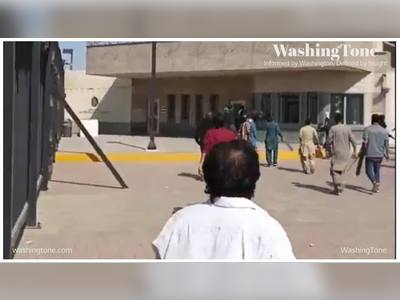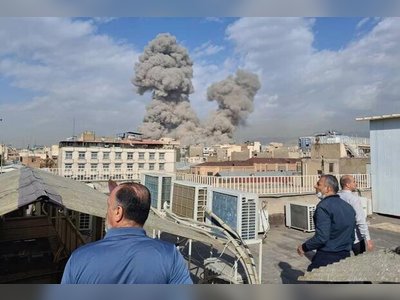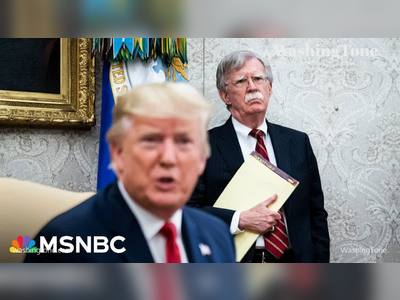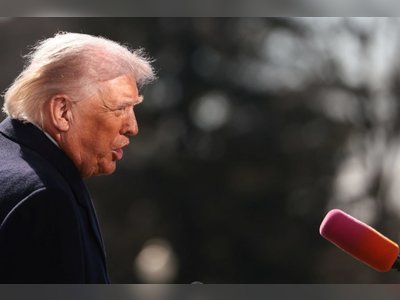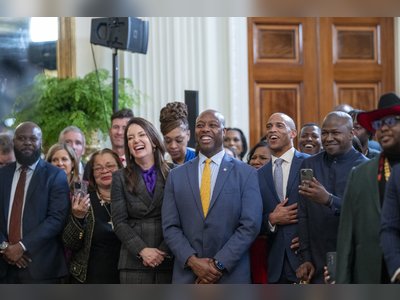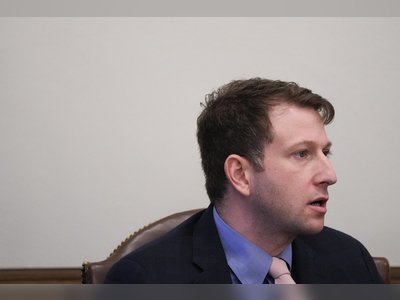White HouseSenateThe HouseSupreme CourtFederal ReserveDOJState DepartmentTreasuryCensusBudget OfficeTrade Representative
WashingTone
Informed by Washington, Defined by Insight
Monday, Mar 02, 2026
WashingTone

Secretary Blinken and the Omani Foreign Minister Deliberate on Regional Stability and Ceasefire Initiatives
The U.S. and Oman discuss important Middle Eastern matters, such as Lebanon's political transition, the Gaza ceasefire, and regional security challenges.
On January 10, 2025, U.S. Secretary of State Antony Blinken had a conversation with Omani Foreign Minister Sayyid Badr Albusaidi to address crucial issues impacting stability in the Middle East.
The dialogue covered pressing topics such as President Aoun's election in Lebanon, efforts to establish a ceasefire in Gaza, and ongoing security concerns, especially relating to the Houthi movement in Yemen.
Lebanon's Presidential Election and Political Stability
The discussion began with a focus on Lebanon's political landscape following Michel Aoun's recent election as president.
Secretary Blinken highlighted the importance of a stable and democratic political transition in Lebanon, aligned with the aspirations of its people.
The U.S. has consistently supported Lebanon's sovereignty and right to self-determination, while also expressing worries about foreign influence and groups like Hezbollah affecting domestic affairs.
Minister Albusaidi, representing Oman, shared the view that Lebanon's political direction should be free from external interference, seeing Aoun's election as a move towards greater stability.
However, he acknowledged the fragile state of Lebanese politics, noting sectarian divisions and external pressures from Iran complicate the national dialogue.
Oman has traditionally facilitated dialogue and stability in the region, maintaining neutrality and underscoring internal reconciliation's importance in Lebanon.
Ceasefire in Gaza and Hostage Release
A significant part of the discussion also addressed the humanitarian crisis in Gaza.
Blinken and Albusaidi stressed the urgent need for a ceasefire to prevent further casualties and facilitate the release of hostages held by militant groups in Gaza.
Blinken reiterated U.S. backing for a ceasefire that allows for the safe return of hostages, a central issue since hostilities erupted.
The U.S. has been actively engaged in diplomatic efforts to de-escalate the situation in Gaza, focusing on securing humanitarian aid access and advocating for international support for a peace agreement.
The situation remains dynamic, with both sides of the conflict entrenched, and the international community remains divided on the best approach to secure peace.
Minister Albusaidi reaffirmed Oman’s consistent position on the Gaza conflict, advocating for a balanced approach that respects both Palestinians' and Israelis' rights and needs.
Oman maintains a relatively neutral stance in the Israeli-Palestinian conflict, acting as a mediator in past negotiations and promoting a broader multilateral approach to peacebuilding.
Houthi Threats to Regional Security
Another central topic was the continued threats posed by the Houthi movement in Yemen.
The Houthis have been involved in a prolonged civil war in Yemen and have launched attacks on neighboring Saudi Arabia and other regional countries.
The U.S. has consistently called for a peaceful resolution to the Yemen conflict and supported UN efforts to bring parties to the negotiating table.
Secretary Blinken expressed concern over the Houthis’ destabilizing actions, particularly their targeting of diplomatic, NGO, and UN personnel in Yemen.
These attacks have heightened tensions and created challenges for international organizations working in Yemen.
The U.S. reiterated its commitment to collaborating with regional partners to address the humanitarian crisis in Yemen and protect civilians and international workers.
Foreign Minister Albusaidi shared Oman’s perspective, highlighting Oman’s long-standing diplomatic engagement with all sides in the Yemen conflict.
Oman has maintained communication channels with the Houthis, serving as a unique voice in the region, advocating for mediation over escalation.
Oman has called for a Yemeni-led peaceful resolution, focusing on a ceasefire and delivering humanitarian aid to those in need.
Syria’s Political Transition
The call concluded with a discussion on Syria, where Secretary Blinken reaffirmed U.S. support for a Syrian-led and Syrian-owned political transition.
The U.S. continues to advocate for an inclusive and representative government accountable to the Syrian people.
This is particularly significant as the U.S. seeks to counter Russia and Iran's influence in Syria and ensure that any political solution respects Syrian sovereignty.
Minister Albusaidi confirmed Oman’s support for a peaceful resolution to the Syrian conflict, stressing international cooperation's need in establishing a solution involving all stakeholders in the Syrian political process.
Oman's approach has been one of quiet diplomacy, underlining the need for dialogue and reconciliation, despite the deeply complex conflict in Syria.
Regional Security and Cooperation
Throughout the call, both officials stressed the importance of regional security and the need for ongoing U.S. and Oman collaboration, particularly in addressing Middle Eastern conflicts.
Both the U.S. and Oman recognize the necessity of a stable and secure region, prioritizing dialogue and diplomacy over military intervention.
Oman's role as a neutral party has positioned it as a key player in resolving the conflicts in Gaza, Yemen, and Syria.
The U.S. and Oman have long maintained a cordial relationship, with Oman often acting as a diplomatic bridge between the U.S. and other regional actors.
Oman’s commitment to regional stability and promoting peaceful solutions is a hallmark of its foreign policy, continuing to foster cooperation across the Middle East.
The dialogue covered pressing topics such as President Aoun's election in Lebanon, efforts to establish a ceasefire in Gaza, and ongoing security concerns, especially relating to the Houthi movement in Yemen.
Lebanon's Presidential Election and Political Stability
The discussion began with a focus on Lebanon's political landscape following Michel Aoun's recent election as president.
Secretary Blinken highlighted the importance of a stable and democratic political transition in Lebanon, aligned with the aspirations of its people.
The U.S. has consistently supported Lebanon's sovereignty and right to self-determination, while also expressing worries about foreign influence and groups like Hezbollah affecting domestic affairs.
Minister Albusaidi, representing Oman, shared the view that Lebanon's political direction should be free from external interference, seeing Aoun's election as a move towards greater stability.
However, he acknowledged the fragile state of Lebanese politics, noting sectarian divisions and external pressures from Iran complicate the national dialogue.
Oman has traditionally facilitated dialogue and stability in the region, maintaining neutrality and underscoring internal reconciliation's importance in Lebanon.
Ceasefire in Gaza and Hostage Release
A significant part of the discussion also addressed the humanitarian crisis in Gaza.
Blinken and Albusaidi stressed the urgent need for a ceasefire to prevent further casualties and facilitate the release of hostages held by militant groups in Gaza.
Blinken reiterated U.S. backing for a ceasefire that allows for the safe return of hostages, a central issue since hostilities erupted.
The U.S. has been actively engaged in diplomatic efforts to de-escalate the situation in Gaza, focusing on securing humanitarian aid access and advocating for international support for a peace agreement.
The situation remains dynamic, with both sides of the conflict entrenched, and the international community remains divided on the best approach to secure peace.
Minister Albusaidi reaffirmed Oman’s consistent position on the Gaza conflict, advocating for a balanced approach that respects both Palestinians' and Israelis' rights and needs.
Oman maintains a relatively neutral stance in the Israeli-Palestinian conflict, acting as a mediator in past negotiations and promoting a broader multilateral approach to peacebuilding.
Houthi Threats to Regional Security
Another central topic was the continued threats posed by the Houthi movement in Yemen.
The Houthis have been involved in a prolonged civil war in Yemen and have launched attacks on neighboring Saudi Arabia and other regional countries.
The U.S. has consistently called for a peaceful resolution to the Yemen conflict and supported UN efforts to bring parties to the negotiating table.
Secretary Blinken expressed concern over the Houthis’ destabilizing actions, particularly their targeting of diplomatic, NGO, and UN personnel in Yemen.
These attacks have heightened tensions and created challenges for international organizations working in Yemen.
The U.S. reiterated its commitment to collaborating with regional partners to address the humanitarian crisis in Yemen and protect civilians and international workers.
Foreign Minister Albusaidi shared Oman’s perspective, highlighting Oman’s long-standing diplomatic engagement with all sides in the Yemen conflict.
Oman has maintained communication channels with the Houthis, serving as a unique voice in the region, advocating for mediation over escalation.
Oman has called for a Yemeni-led peaceful resolution, focusing on a ceasefire and delivering humanitarian aid to those in need.
Syria’s Political Transition
The call concluded with a discussion on Syria, where Secretary Blinken reaffirmed U.S. support for a Syrian-led and Syrian-owned political transition.
The U.S. continues to advocate for an inclusive and representative government accountable to the Syrian people.
This is particularly significant as the U.S. seeks to counter Russia and Iran's influence in Syria and ensure that any political solution respects Syrian sovereignty.
Minister Albusaidi confirmed Oman’s support for a peaceful resolution to the Syrian conflict, stressing international cooperation's need in establishing a solution involving all stakeholders in the Syrian political process.
Oman's approach has been one of quiet diplomacy, underlining the need for dialogue and reconciliation, despite the deeply complex conflict in Syria.
Regional Security and Cooperation
Throughout the call, both officials stressed the importance of regional security and the need for ongoing U.S. and Oman collaboration, particularly in addressing Middle Eastern conflicts.
Both the U.S. and Oman recognize the necessity of a stable and secure region, prioritizing dialogue and diplomacy over military intervention.
Oman's role as a neutral party has positioned it as a key player in resolving the conflicts in Gaza, Yemen, and Syria.
The U.S. and Oman have long maintained a cordial relationship, with Oman often acting as a diplomatic bridge between the U.S. and other regional actors.
Oman’s commitment to regional stability and promoting peaceful solutions is a hallmark of its foreign policy, continuing to foster cooperation across the Middle East.
